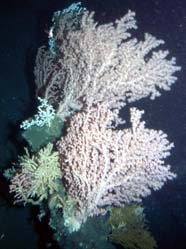February 14, 2005
2/14 - Oceana Beloved By Deep Water Corals: Huge victory in N. Pacific bottom trawling debate
A lot of deep water hard corals can sleep a little better tonight, thanks to the determination of Oceana. Here's an excerpt from their press release:
The Council voted unanimously Feb. 10 to adopt Oceana's approach to protect 960,495 square kilometers of seafloor from destructive bottom trawling, a commercial fishing practice that drags heavy nets across the ocean bottom, destroying nearly everything in its path. The vote included 380 square kilometers banned to all bottom gear contact in the deep-sea coral and sponge gardens in the Aleutian Islands, and 7,156 square kilometers of seafloor in the Gulf of Alaska banned to bottom trawling.

Sleeping Better Tonight: deep water corals that won't get ravaged by
bottom trawls
Randy: Thanks for the note on the success of the North Pacific deep sea coral project. But, as you and others in the community know, it takes more than one organization to bring the changes necessary for the health of the oceans.
In this case, the Alaska Marine Conservation Council, The Ocean Conservancy and the Alaska Oceans Network were just a few of the many local, regional and national organizations that are entitled to join in the celebration of this great step forward in ocean management. More than 30,000 members of these and other conservation and other stakeholder organizations wrote and called decision-makers on the way to our victory. In the end, even the trawl fishermen and their advocacy organizations joined in supporting this change to a new and progressive model for oceans mamagement.
Now we all move on to build even broader support for similar actions in the other fishery management councils, in the halls of Congress and with NOAA in the Department of Commerce.
Here's to more success for all of us and for the oceans.
Dave Allison, Director,
Oceana's campaign to stop destructive trawling.